
dexter
LLM tools used in production at Dexa
Stars: 74
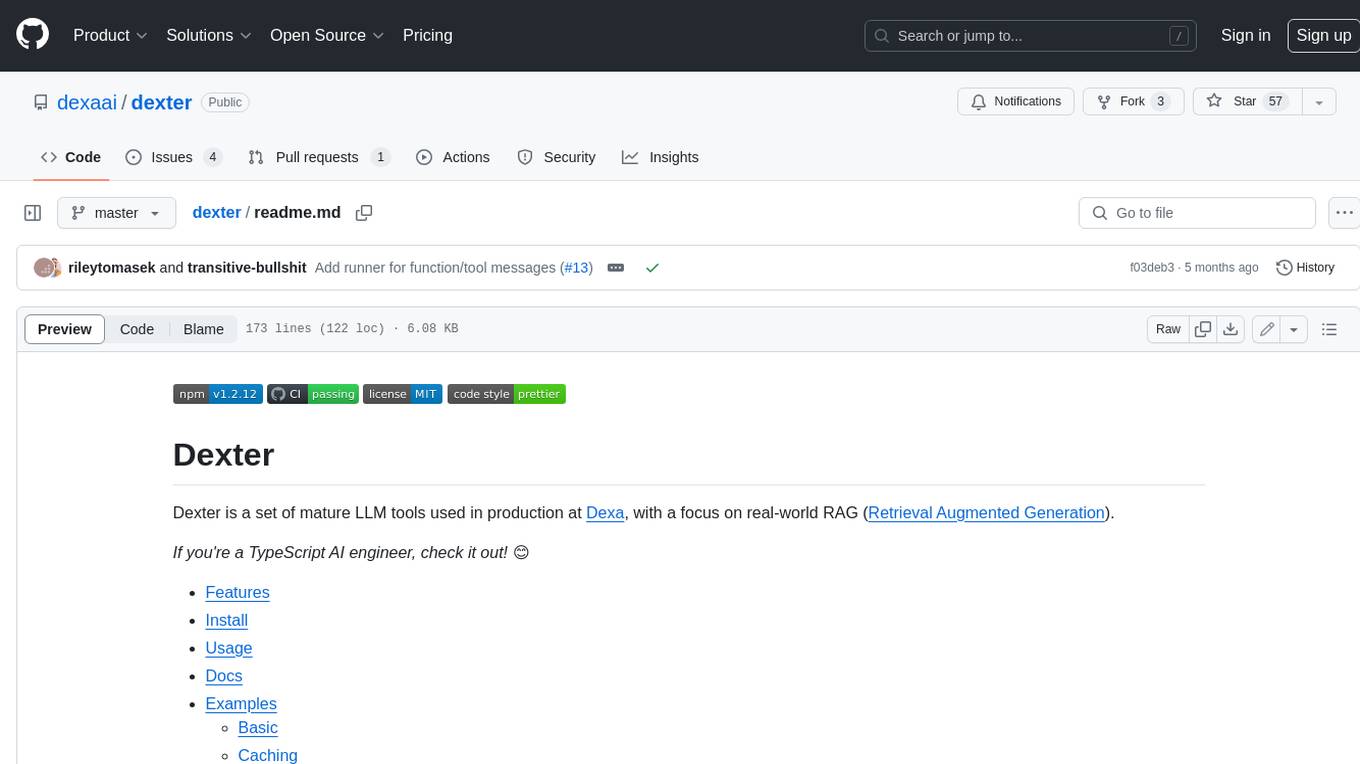
Dexter is a set of mature LLM tools used in production at Dexa, with a focus on real-world RAG (Retrieval Augmented Generation). It is a production-quality RAG that is extremely fast and minimal, and handles caching, throttling, and batching for ingesting large datasets. It also supports optional hybrid search with SPLADE embeddings, and is a minimal TS package with full typing that uses `fetch` everywhere and supports Node.js 18+, Deno, Cloudflare Workers, Vercel edge functions, etc. Dexter has full docs and includes examples for basic usage, caching, Redis caching, AI function, AI runner, and chatbot.
README:
Dexter is a set of mature LLM tools used in production at Dexa, with a focus on real-world RAG (Retrieval Augmented Generation).
If you're a TypeScript AI engineer, check it out! 😊
- production-quality RAG
- extremely fast and minimal
- handles caching, throttling, and batching for ingesting large datasets
- optional hybrid search w/ SPLADE embeddings
- minimal TS package w/ full typing
- uses
fetcheverywhere - supports Node.js 18+, Deno, Cloudflare Workers, Vercel edge functions, etc
- full docs
npm install @dexaai/dexterThis package requires node >= 18 or an environment with fetch support.
This package exports ESM. If your project uses CommonJS, consider switching to ESM or use the dynamic import() function.
This is a basic example using OpenAI's text-embedding-ada-002 embedding model and a Pinecone datastore to index and query a set of documents.
import 'dotenv/config';
import { EmbeddingModel } from '@dexaai/dexter/model';
import { PineconeDatastore } from '@dexaai/dexter/datastore/pinecone';
async function example() {
const embeddingModel = new EmbeddingModel({
params: { model: 'text-embedding-ada-002' },
});
const store = new PineconeDatastore({
contentKey: 'content',
embeddingModel,
});
await store.upsert([
{ id: '1', metadata: { content: 'cat' } },
{ id: '2', metadata: { content: 'dog' } },
{ id: '3', metadata: { content: 'whale' } },
{ id: '4', metadata: { content: 'shark' } },
{ id: '5', metadata: { content: 'computer' } },
{ id: '6', metadata: { content: 'laptop' } },
{ id: '7', metadata: { content: 'phone' } },
{ id: '8', metadata: { content: 'tablet' } },
]);
const result = await store.query({ query: 'dolphin' });
console.log(result);
}See the docs for a full usage guide and API reference.
To run the included examples, clone this repo, run pnpm install, set up your .env file, and then run an example file using tsx.
Environment variables required to run the examples:
-
OPENAI_API_KEY- OpenAI API key -
PINECONE_API_KEY- Pinecone API key -
PINECONE_BASE_URL- Pinecone index's base URL- You should be able to use a free-tier "starter" index for most of the examples, but you'll need to upgrade to a paid index to run the any of the hybrid search examples
- Note that Pinecone's free starter index doesn't support namespaces,
deleteAll, or hybrid search :sigh:
-
SPLADE_SERVICE_URL- optional; only used for the chatbot hybrid search example
npx tsx examples/basic.tsnpx tsx examples/caching.tsThis example requires a valid REDIS_URL env var.
npx tsx examples/caching-redis.tsThis example shows how to use createAIFunction to handle function and tool_calls with the OpenAI chat completions API and Zod.
npx tsx examples/ai-function.tsThis example shows how to use createAIRunner to easily invoke a chain of OpenAI chat completion calls, resolving tool / function calls, retrying when necessary, and optionally validating the resulting output via Zod.
Note that createAIRunner takes in a functions array of AIFunction objects created by createAIFunction, as the two utility functions are meant to used together.
npx tsx examples/ai-runner.tsThis is a more involved example of a chatbot using RAG. It indexes 100 transcript chunks from the Huberman Lab Podcast into a hybrid Pinecone datastore using OpenAI ada-002 embeddings for the dense vectors and a HuggingFace SPLADE model for the sparse embeddings.
You'll need the following environment variables to run this example:
OPENAI_API_KEYPINECONE_API_KEY-
PINECONE_BASE_URL- Note: Pinecone's free starter indexes don't seem to support namespaces or hybrid search, so unfortunately you'll need to upgrade to a paid plan to run this example. See Pinecone's hybrid docs for details on setting up a hybrid index, and make sure it is using the
dotproductmetric.
- Note: Pinecone's free starter indexes don't seem to support namespaces or hybrid search, so unfortunately you'll need to upgrade to a paid plan to run this example. See Pinecone's hybrid docs for details on setting up a hybrid index, and make sure it is using the
-
SPLADE_SERVICE_URL
npx tsx examples/chatbot/ingest.tsnpx tsx examples/chatbot/cli.tsMIT © Dexa
For Tasks:
Click tags to check more tools for each tasksFor Jobs:
Alternative AI tools for dexter
Similar Open Source Tools

dexter
Dexter is a set of mature LLM tools used in production at Dexa, with a focus on real-world RAG (Retrieval Augmented Generation). It is a production-quality RAG that is extremely fast and minimal, and handles caching, throttling, and batching for ingesting large datasets. It also supports optional hybrid search with SPLADE embeddings, and is a minimal TS package with full typing that uses `fetch` everywhere and supports Node.js 18+, Deno, Cloudflare Workers, Vercel edge functions, etc. Dexter has full docs and includes examples for basic usage, caching, Redis caching, AI function, AI runner, and chatbot.
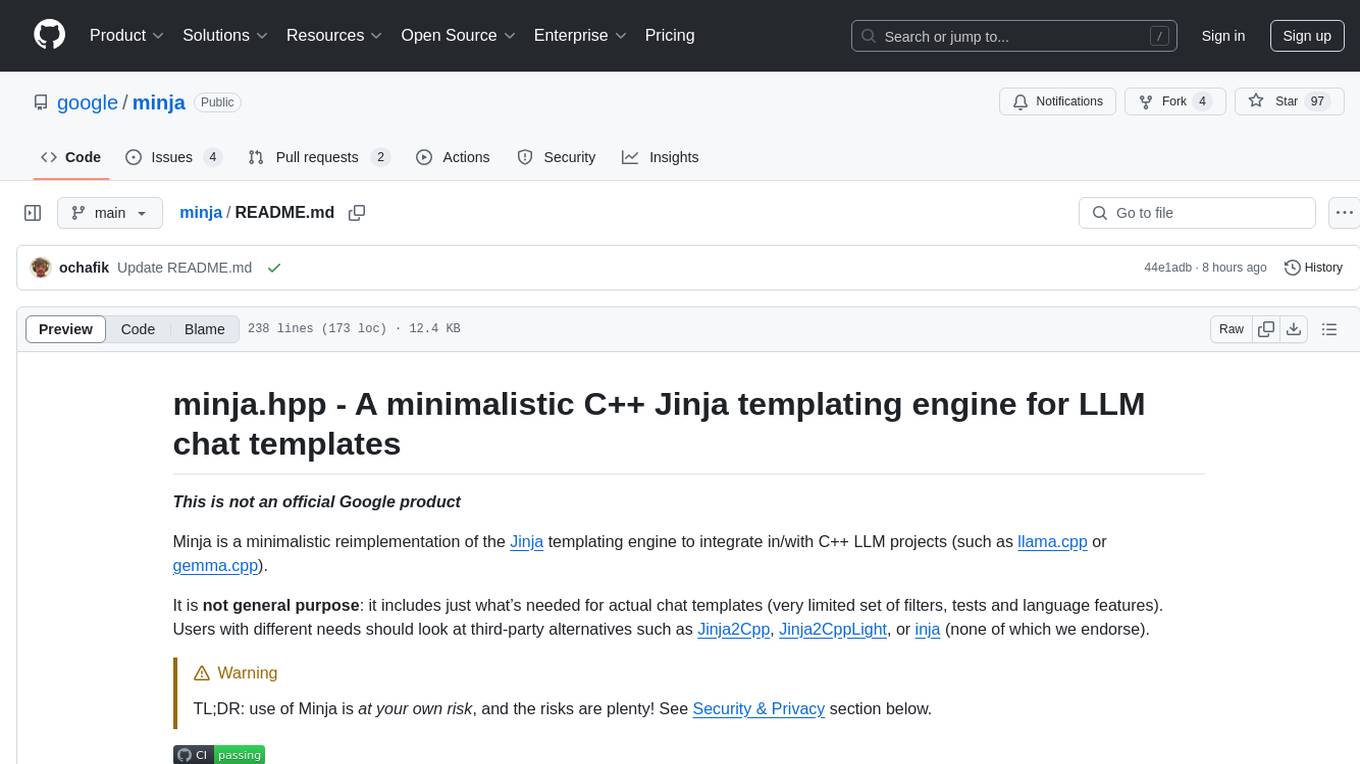
minja
Minja is a minimalistic C++ Jinja templating engine designed specifically for integration with C++ LLM projects, such as llama.cpp or gemma.cpp. It is not a general-purpose tool but focuses on providing a limited set of filters, tests, and language features tailored for chat templates. The library is header-only, requires C++17, and depends only on nlohmann::json. Minja aims to keep the codebase small, easy to understand, and offers decent performance compared to Python. Users should be cautious when using Minja due to potential security risks, and it is not intended for producing HTML or JavaScript output.
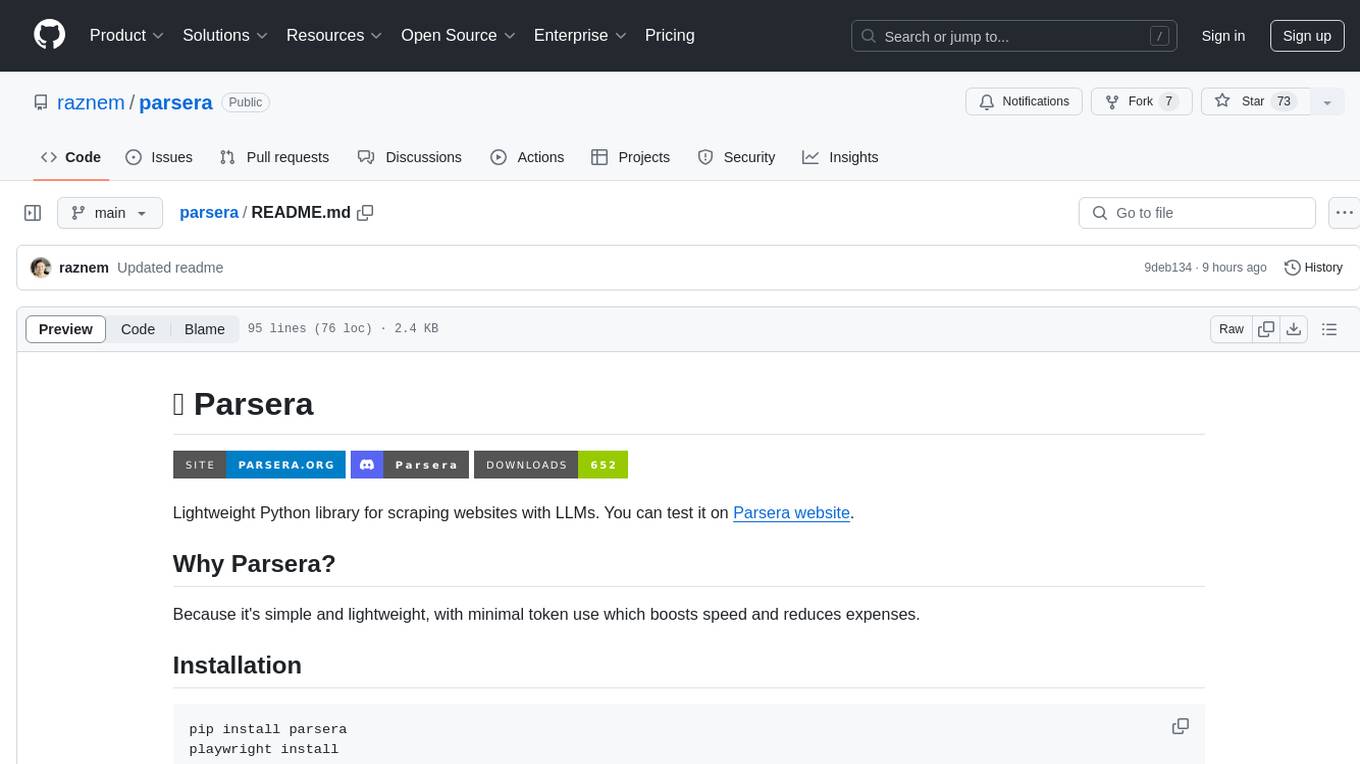
parsera
Parsera is a lightweight Python library designed for scraping websites using LLMs. It offers simplicity and efficiency by minimizing token usage, enhancing speed, and reducing costs. Users can easily set up and run the tool to extract specific elements from web pages, generating JSON output with relevant data. Additionally, Parsera supports integration with various chat models, such as Azure, expanding its functionality and customization options for web scraping tasks.

instructor
Instructor is a popular Python library for managing structured outputs from large language models (LLMs). It offers a user-friendly API for validation, retries, and streaming responses. With support for various LLM providers and multiple languages, Instructor simplifies working with LLM outputs. The library includes features like response models, retry management, validation, streaming support, and flexible backends. It also provides hooks for logging and monitoring LLM interactions, and supports integration with Anthropic, Cohere, Gemini, Litellm, and Google AI models. Instructor facilitates tasks such as extracting user data from natural language, creating fine-tuned models, managing uploaded files, and monitoring usage of OpenAI models.
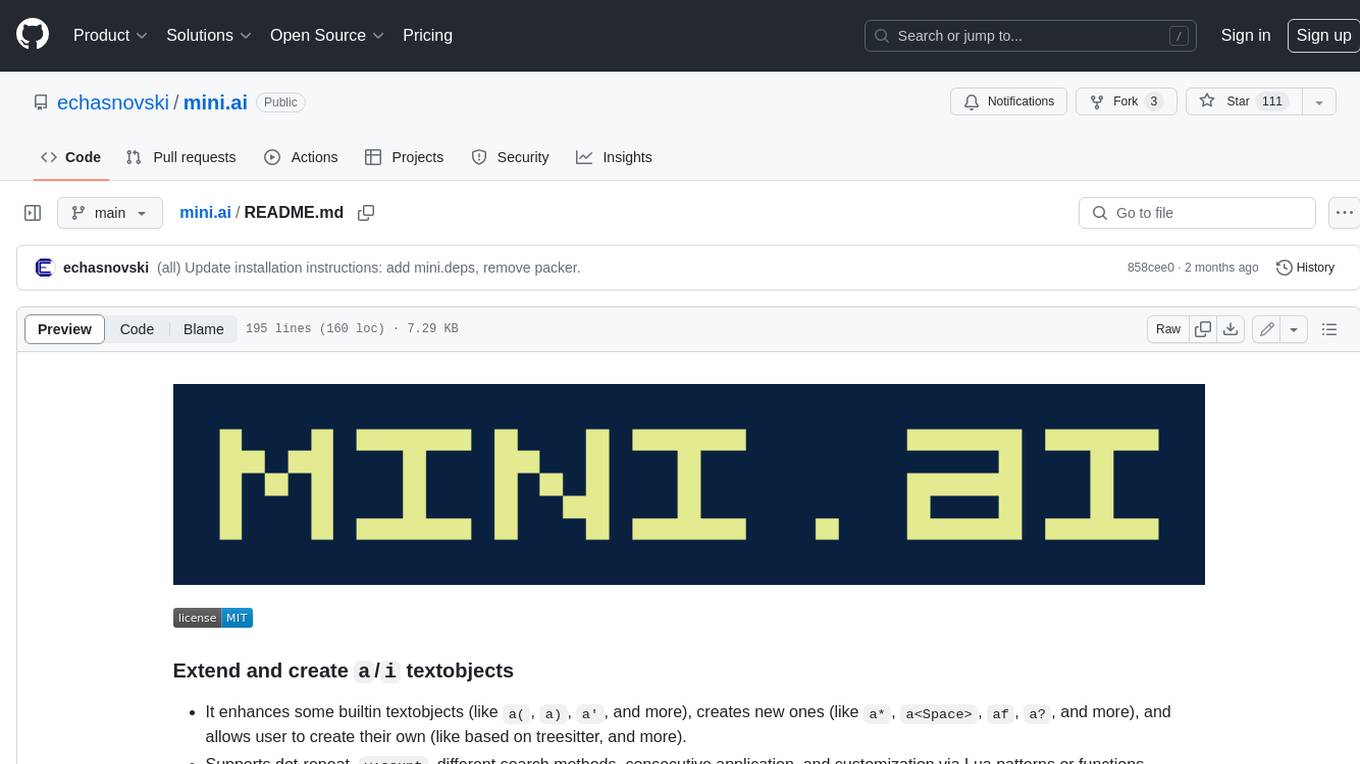
mini.ai
This plugin extends and creates `a`/`i` textobjects in Neovim. It enhances some builtin textobjects (like `a(`, `a)`, `a'`, and more), creates new ones (like `a*`, `a
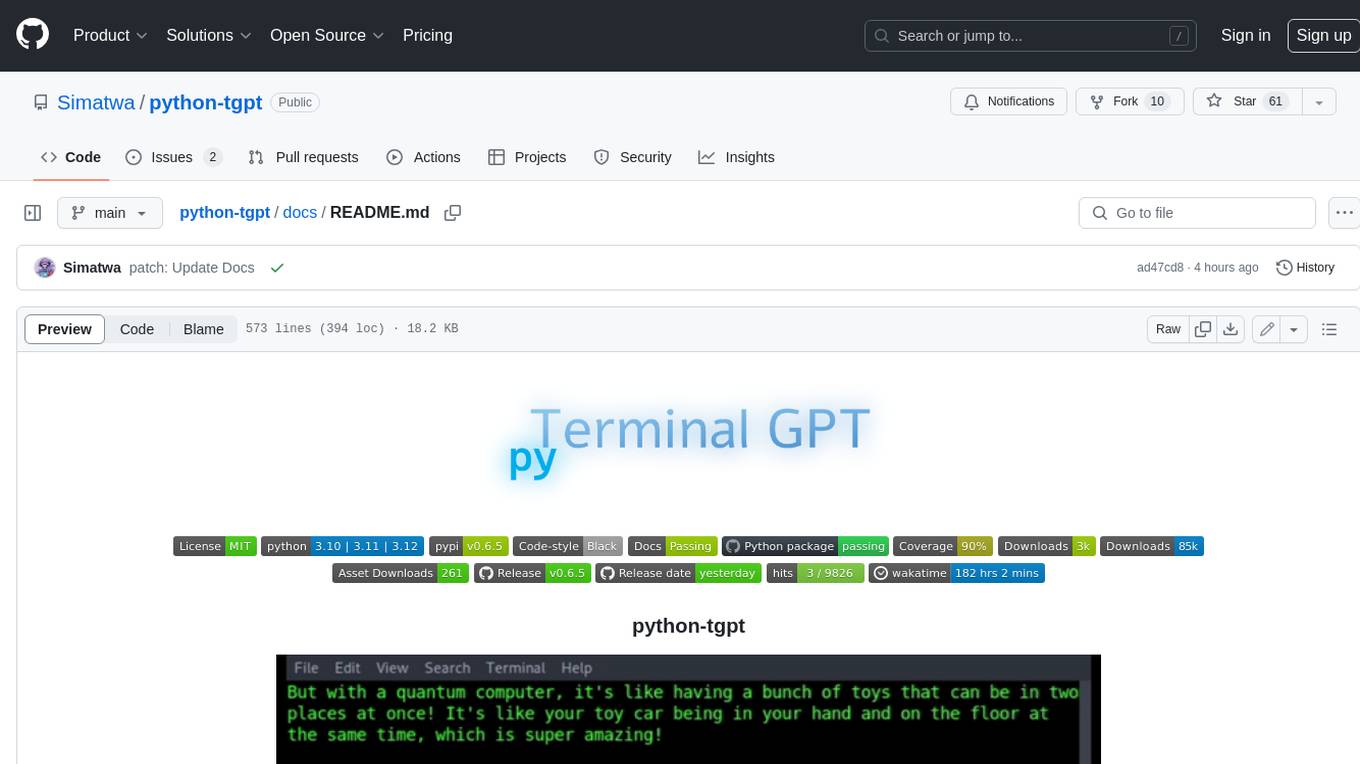
python-tgpt
Python-tgpt is a Python package that enables seamless interaction with over 45 free LLM providers without requiring an API key. It also provides image generation capabilities. The name _python-tgpt_ draws inspiration from its parent project tgpt, which operates on Golang. Through this Python adaptation, users can effortlessly engage with a number of free LLMs available, fostering a smoother AI interaction experience.
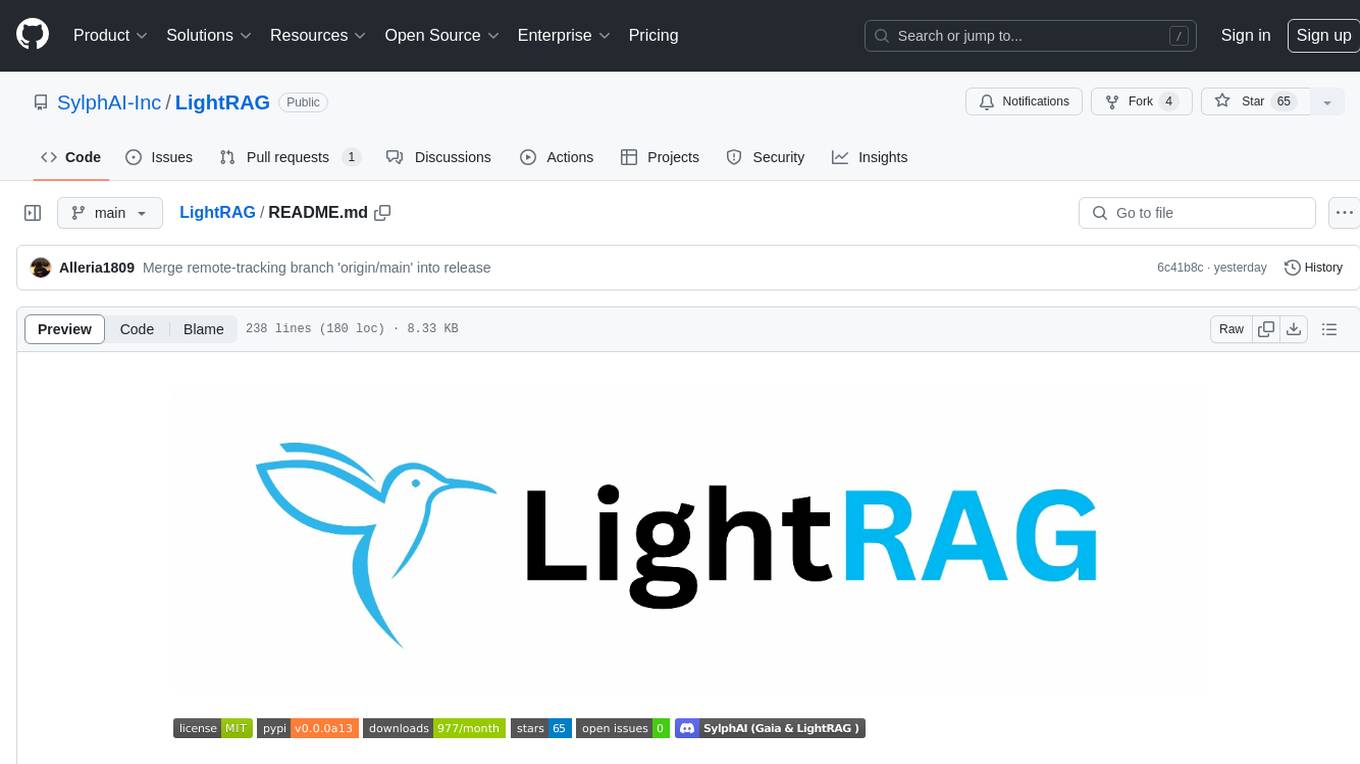
LightRAG
LightRAG is a PyTorch library designed for building and optimizing Retriever-Agent-Generator (RAG) pipelines. It follows principles of simplicity, quality, and optimization, offering developers maximum customizability with minimal abstraction. The library includes components for model interaction, output parsing, and structured data generation. LightRAG facilitates tasks like providing explanations and examples for concepts through a question-answering pipeline.

react-native-vercel-ai
Run Vercel AI package on React Native, Expo, Web and Universal apps. Currently React Native fetch API does not support streaming which is used as a default on Vercel AI. This package enables you to use AI library on React Native but the best usage is when used on Expo universal native apps. On mobile you get back responses without streaming with the same API of `useChat` and `useCompletion` and on web it will fallback to `ai/react`
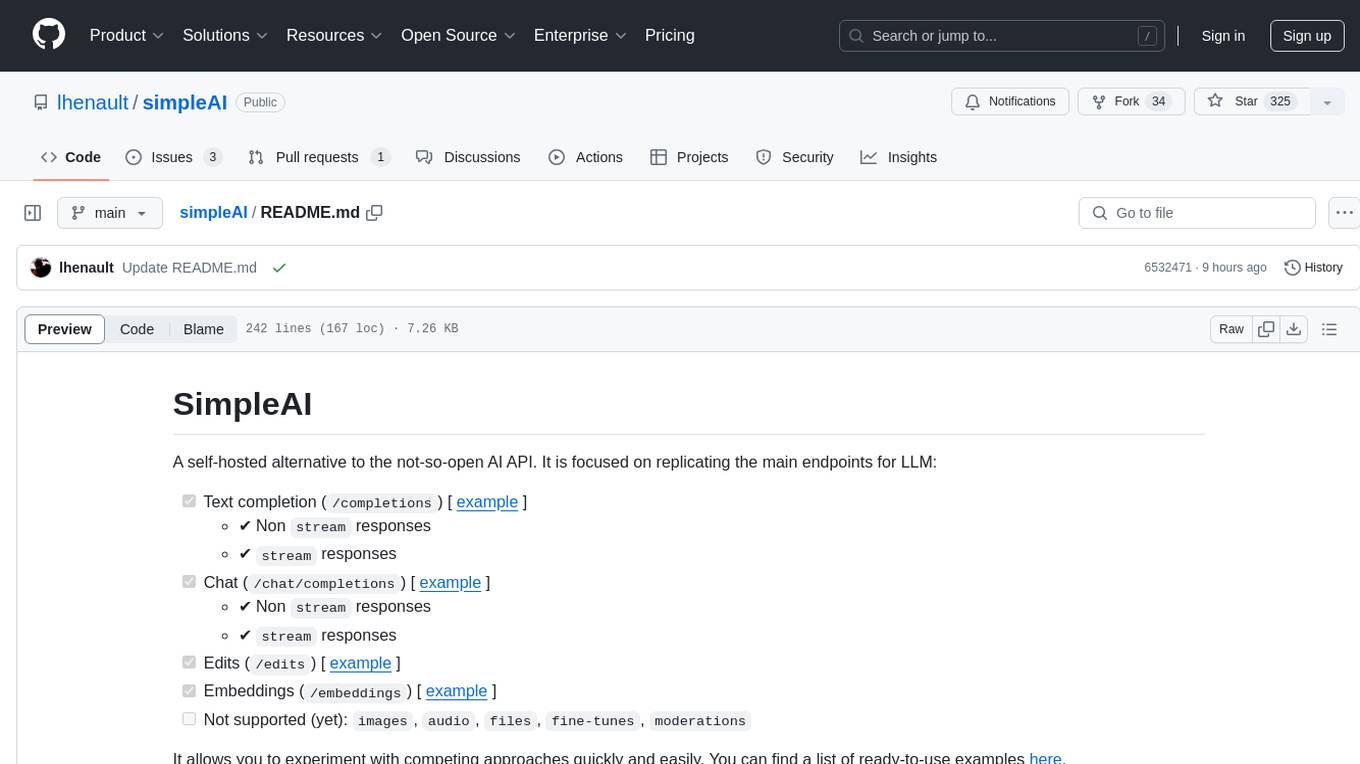
simpleAI
SimpleAI is a self-hosted alternative to the not-so-open AI API, focused on replicating main endpoints for LLM such as text completion, chat, edits, and embeddings. It allows quick experimentation with different models, creating benchmarks, and handling specific use cases without relying on external services. Users can integrate and declare models through gRPC, query endpoints using Swagger UI or API, and resolve common issues like CORS with FastAPI middleware. The project is open for contributions and welcomes PRs, issues, documentation, and more.
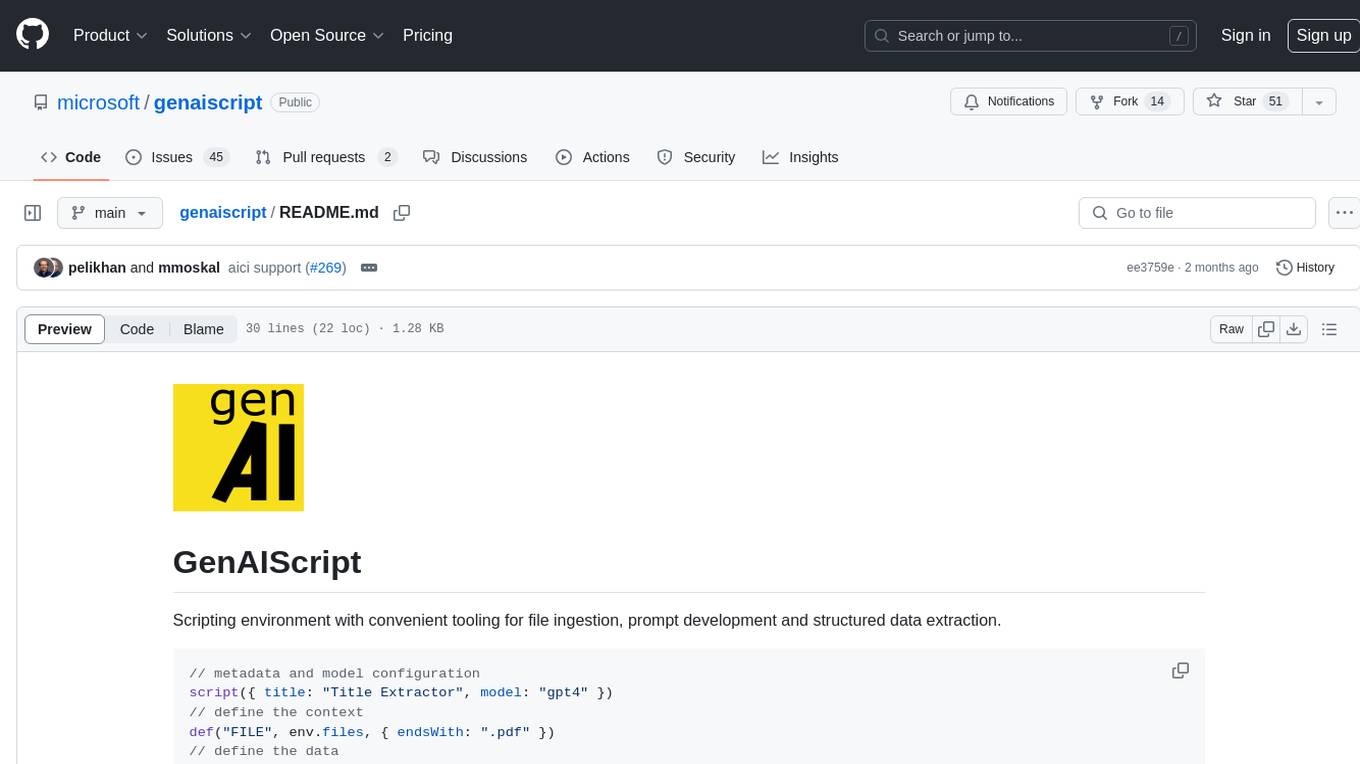
genaiscript
GenAIScript is a scripting environment designed to facilitate file ingestion, prompt development, and structured data extraction. Users can define metadata and model configurations, specify data sources, and define tasks to extract specific information. The tool provides a convenient way to analyze files and extract desired content in a structured format. It offers a user-friendly interface for working with data and automating data extraction processes, making it suitable for various data processing tasks.
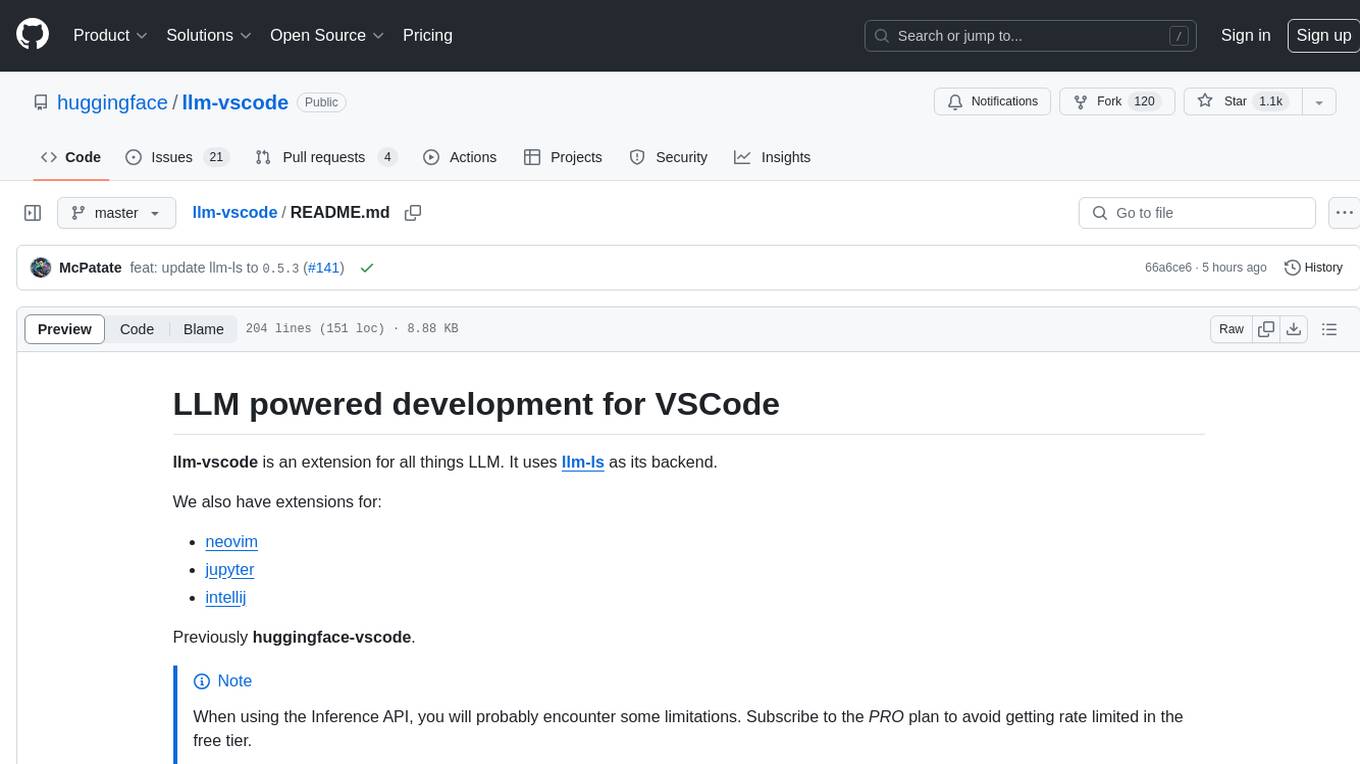
llm-vscode
llm-vscode is an extension designed for all things LLM, utilizing llm-ls as its backend. It offers features such as code completion with 'ghost-text' suggestions, the ability to choose models for code generation via HTTP requests, ensuring prompt size fits within the context window, and code attribution checks. Users can configure the backend, suggestion behavior, keybindings, llm-ls settings, and tokenization options. Additionally, the extension supports testing models like Code Llama 13B, Phind/Phind-CodeLlama-34B-v2, and WizardLM/WizardCoder-Python-34B-V1.0. Development involves cloning llm-ls, building it, and setting up the llm-vscode extension for use.
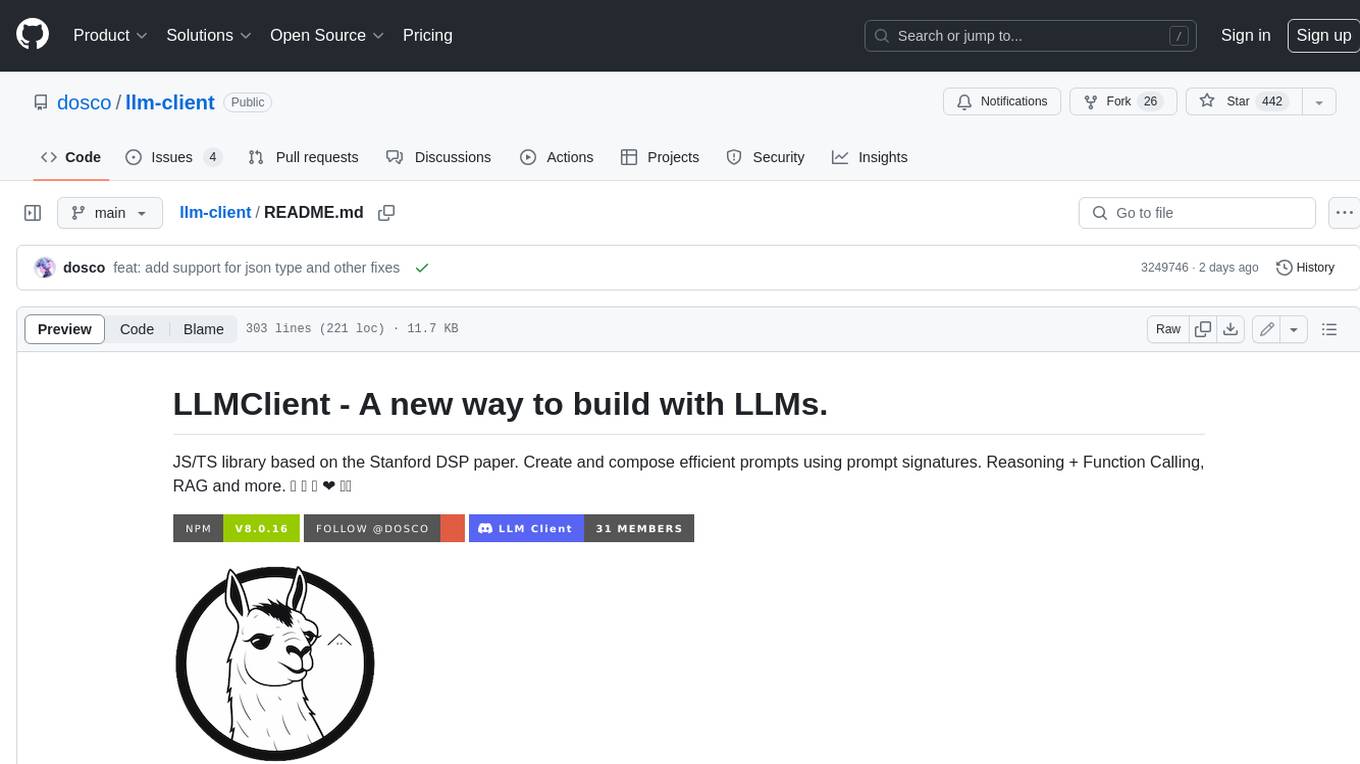
llm-client
LLMClient is a JavaScript/TypeScript library that simplifies working with large language models (LLMs) by providing an easy-to-use interface for building and composing efficient prompts using prompt signatures. These signatures enable the automatic generation of typed prompts, allowing developers to leverage advanced capabilities like reasoning, function calling, RAG, ReAcT, and Chain of Thought. The library supports various LLMs and vector databases, making it a versatile tool for a wide range of applications.
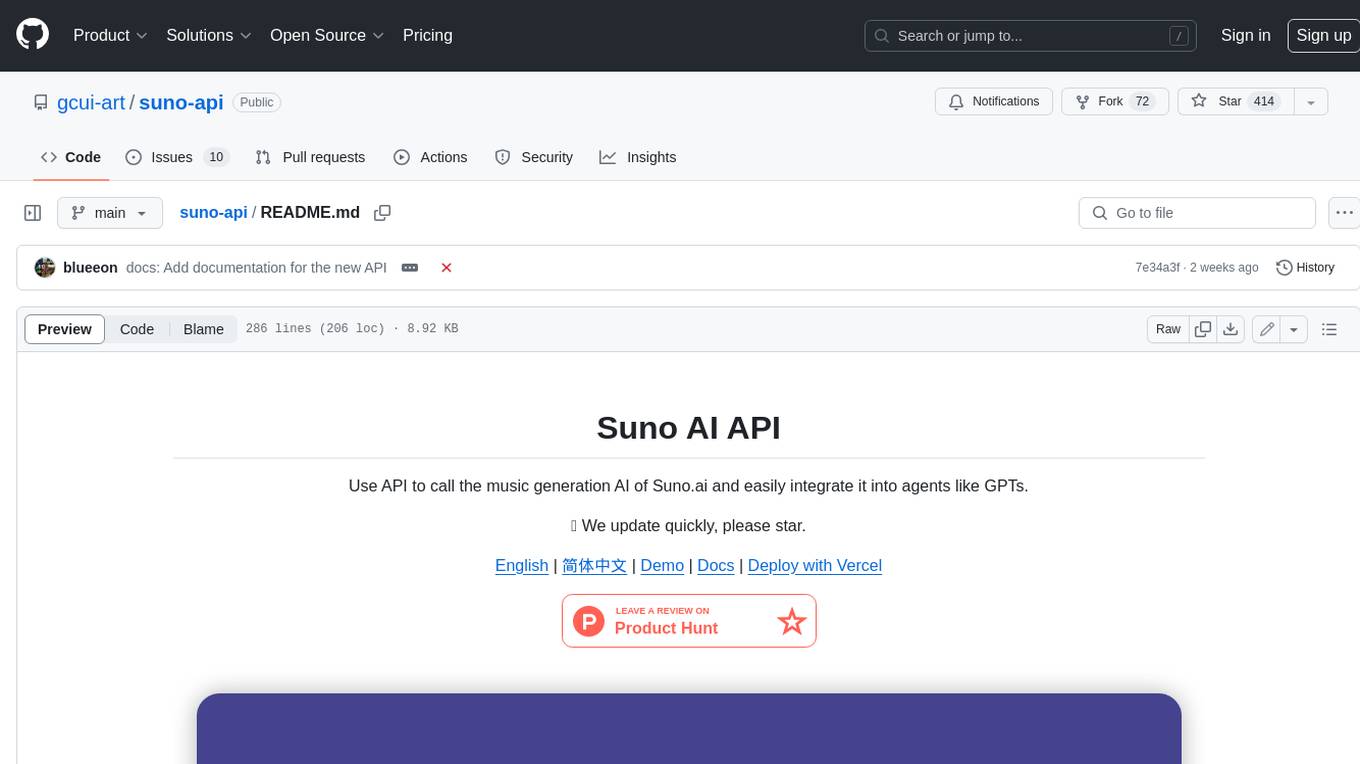
suno-api
Suno AI API is an open-source project that allows developers to integrate the music generation capabilities of Suno.ai into their own applications. The API provides a simple and convenient way to generate music, lyrics, and other audio content using Suno.ai's powerful AI models. With Suno AI API, developers can easily add music generation functionality to their apps, websites, and other projects.
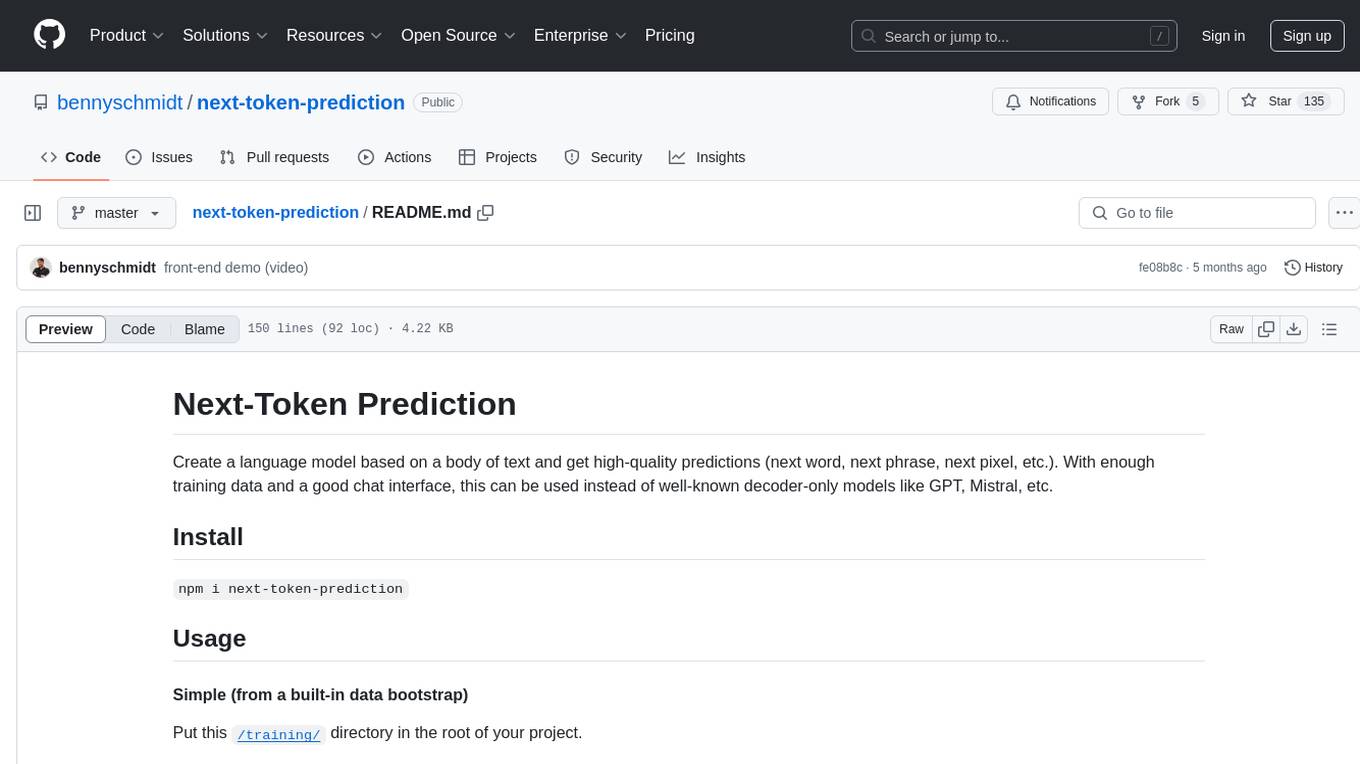
next-token-prediction
Next-Token Prediction is a language model tool that allows users to create high-quality predictions for the next word, phrase, or pixel based on a body of text. It can be used as an alternative to well-known decoder-only models like GPT and Mistral. The tool provides options for simple usage with built-in data bootstrap or advanced customization by providing training data or creating it from .txt files. It aims to simplify methodologies, provide autocomplete, autocorrect, spell checking, search/lookup functionalities, and create pixel and audio transformers for various prediction formats.

langserve
LangServe helps developers deploy `LangChain` runnables and chains as a REST API. This library is integrated with FastAPI and uses pydantic for data validation. In addition, it provides a client that can be used to call into runnables deployed on a server. A JavaScript client is available in LangChain.js.
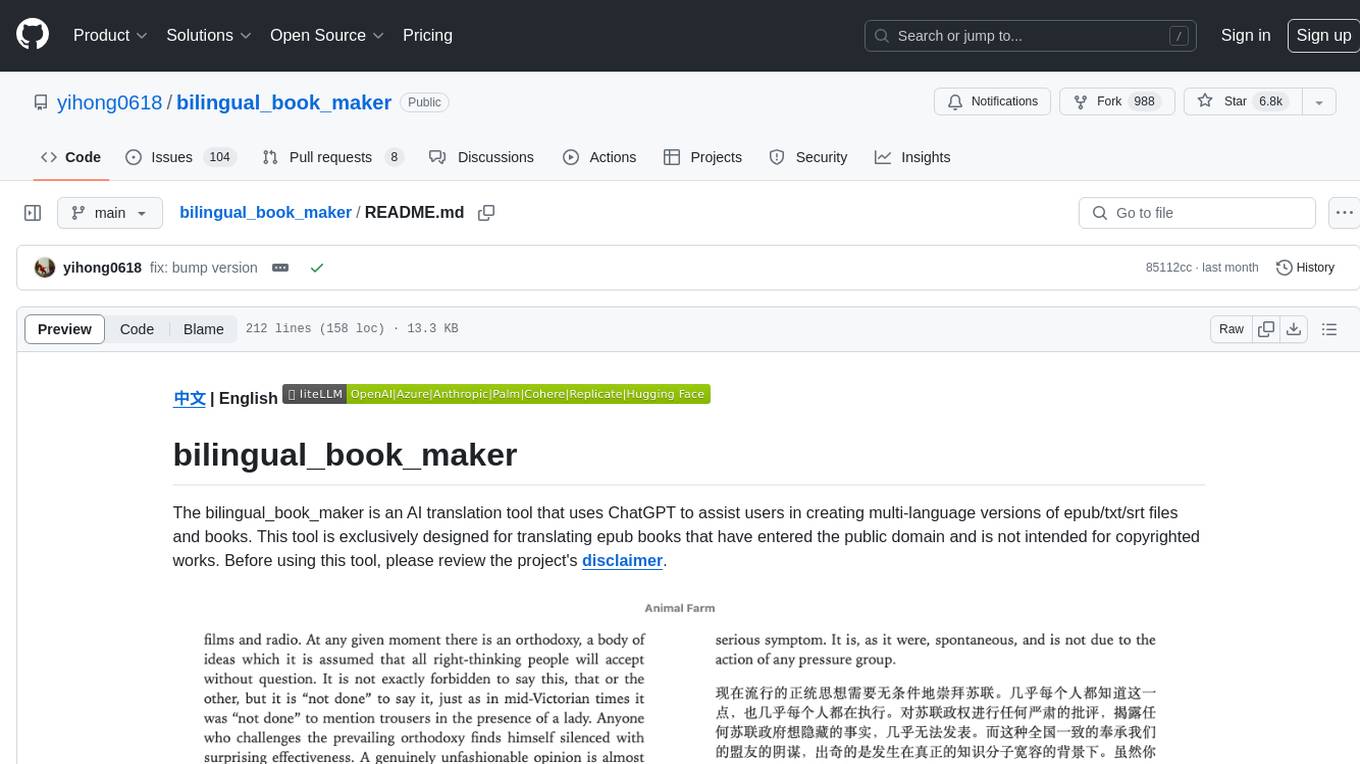
bilingual_book_maker
The bilingual_book_maker is an AI translation tool that uses ChatGPT to assist users in creating multi-language versions of epub/txt/srt files and books. It supports various models like gpt-4, gpt-3.5-turbo, claude-2, palm, llama-2, azure-openai, command-nightly, and gemini. Users need ChatGPT or OpenAI token, epub/txt books, internet access, and Python 3.8+. The tool provides options to specify OpenAI API key, model selection, target language, proxy server, context addition, translation style, and more. It generates bilingual books in epub format after translation. Users can test translations, set batch size, tweak prompts, and use different models like DeepL, Google Gemini, Tencent TranSmart, and more. The tool also supports retranslation, translating specific tags, and e-reader type specification. Docker usage is available for easy setup.
For similar tasks

agentcloud
AgentCloud is an open-source platform that enables companies to build and deploy private LLM chat apps, empowering teams to securely interact with their data. It comprises three main components: Agent Backend, Webapp, and Vector Proxy. To run this project locally, clone the repository, install Docker, and start the services. The project is licensed under the GNU Affero General Public License, version 3 only. Contributions and feedback are welcome from the community.

zep-python
Zep is an open-source platform for building and deploying large language model (LLM) applications. It provides a suite of tools and services that make it easy to integrate LLMs into your applications, including chat history memory, embedding, vector search, and data enrichment. Zep is designed to be scalable, reliable, and easy to use, making it a great choice for developers who want to build LLM-powered applications quickly and easily.

lollms
LoLLMs Server is a text generation server based on large language models. It provides a Flask-based API for generating text using various pre-trained language models. This server is designed to be easy to install and use, allowing developers to integrate powerful text generation capabilities into their applications.
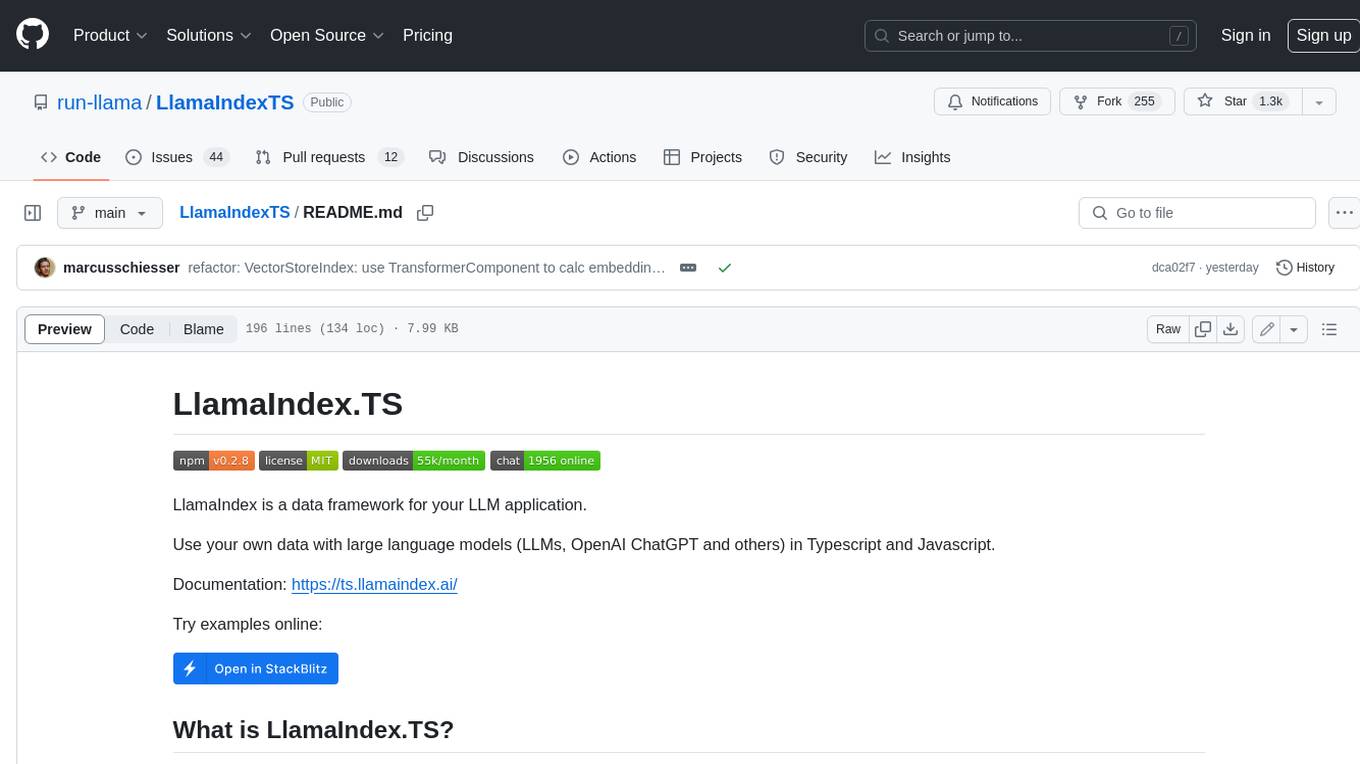
LlamaIndexTS
LlamaIndex.TS is a data framework for your LLM application. Use your own data with large language models (LLMs, OpenAI ChatGPT and others) in Typescript and Javascript.

semantic-kernel
Semantic Kernel is an SDK that integrates Large Language Models (LLMs) like OpenAI, Azure OpenAI, and Hugging Face with conventional programming languages like C#, Python, and Java. Semantic Kernel achieves this by allowing you to define plugins that can be chained together in just a few lines of code. What makes Semantic Kernel _special_ , however, is its ability to _automatically_ orchestrate plugins with AI. With Semantic Kernel planners, you can ask an LLM to generate a plan that achieves a user's unique goal. Afterwards, Semantic Kernel will execute the plan for the user.

botpress
Botpress is a platform for building next-generation chatbots and assistants powered by OpenAI. It provides a range of tools and integrations to help developers quickly and easily create and deploy chatbots for various use cases.
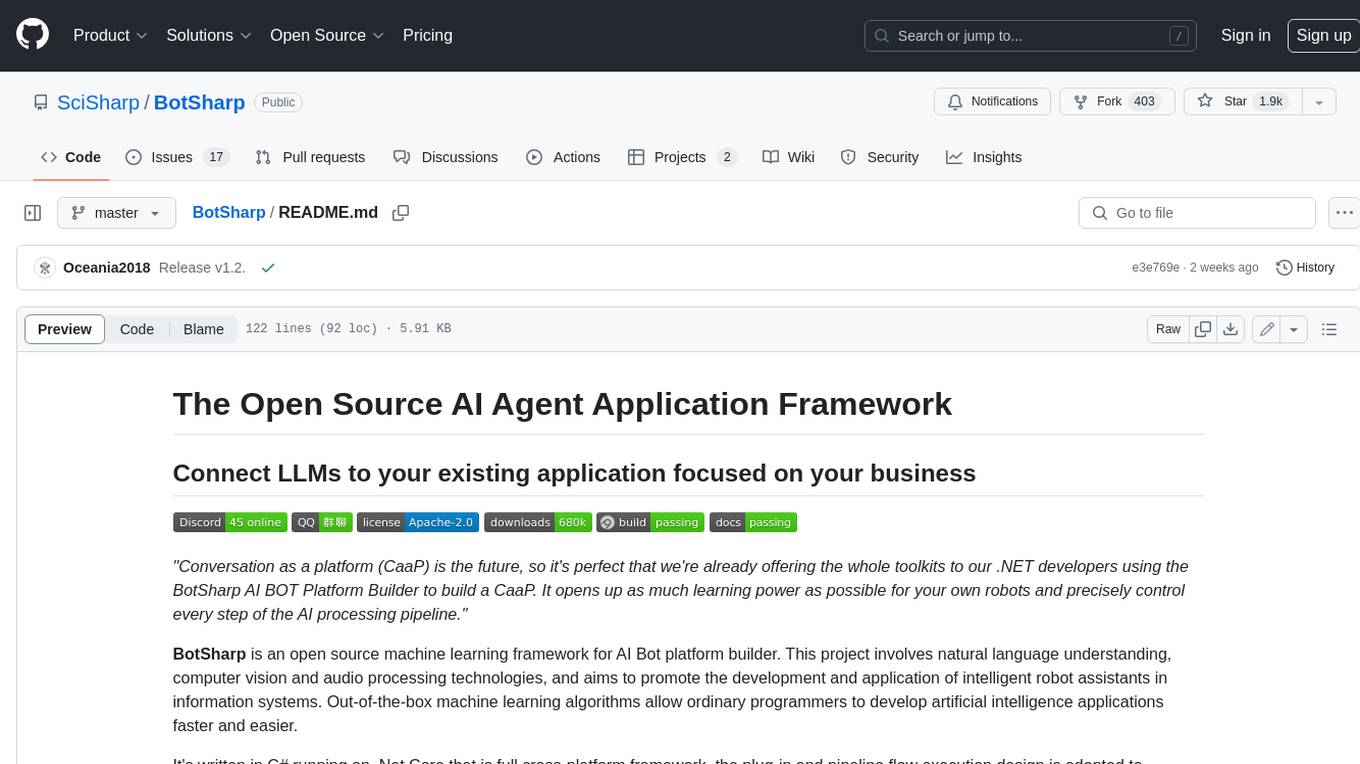
BotSharp
BotSharp is an open-source machine learning framework for building AI bot platforms. It provides a comprehensive set of tools and components for developing and deploying intelligent virtual assistants. BotSharp is designed to be modular and extensible, allowing developers to easily integrate it with their existing systems and applications. With BotSharp, you can quickly and easily create AI-powered chatbots, virtual assistants, and other conversational AI applications.

qdrant
Qdrant is a vector similarity search engine and vector database. It is written in Rust, which makes it fast and reliable even under high load. Qdrant can be used for a variety of applications, including: * Semantic search * Image search * Product recommendations * Chatbots * Anomaly detection Qdrant offers a variety of features, including: * Payload storage and filtering * Hybrid search with sparse vectors * Vector quantization and on-disk storage * Distributed deployment * Highlighted features such as query planning, payload indexes, SIMD hardware acceleration, async I/O, and write-ahead logging Qdrant is available as a fully managed cloud service or as an open-source software that can be deployed on-premises.
For similar jobs

sweep
Sweep is an AI junior developer that turns bugs and feature requests into code changes. It automatically handles developer experience improvements like adding type hints and improving test coverage.

teams-ai
The Teams AI Library is a software development kit (SDK) that helps developers create bots that can interact with Teams and Microsoft 365 applications. It is built on top of the Bot Framework SDK and simplifies the process of developing bots that interact with Teams' artificial intelligence capabilities. The SDK is available for JavaScript/TypeScript, .NET, and Python.

ai-guide
This guide is dedicated to Large Language Models (LLMs) that you can run on your home computer. It assumes your PC is a lower-end, non-gaming setup.

classifai
Supercharge WordPress Content Workflows and Engagement with Artificial Intelligence. Tap into leading cloud-based services like OpenAI, Microsoft Azure AI, Google Gemini and IBM Watson to augment your WordPress-powered websites. Publish content faster while improving SEO performance and increasing audience engagement. ClassifAI integrates Artificial Intelligence and Machine Learning technologies to lighten your workload and eliminate tedious tasks, giving you more time to create original content that matters.

chatbot-ui
Chatbot UI is an open-source AI chat app that allows users to create and deploy their own AI chatbots. It is easy to use and can be customized to fit any need. Chatbot UI is perfect for businesses, developers, and anyone who wants to create a chatbot.

BricksLLM
BricksLLM is a cloud native AI gateway written in Go. Currently, it provides native support for OpenAI, Anthropic, Azure OpenAI and vLLM. BricksLLM aims to provide enterprise level infrastructure that can power any LLM production use cases. Here are some use cases for BricksLLM: * Set LLM usage limits for users on different pricing tiers * Track LLM usage on a per user and per organization basis * Block or redact requests containing PIIs * Improve LLM reliability with failovers, retries and caching * Distribute API keys with rate limits and cost limits for internal development/production use cases * Distribute API keys with rate limits and cost limits for students

uAgents
uAgents is a Python library developed by Fetch.ai that allows for the creation of autonomous AI agents. These agents can perform various tasks on a schedule or take action on various events. uAgents are easy to create and manage, and they are connected to a fast-growing network of other uAgents. They are also secure, with cryptographically secured messages and wallets.

griptape
Griptape is a modular Python framework for building AI-powered applications that securely connect to your enterprise data and APIs. It offers developers the ability to maintain control and flexibility at every step. Griptape's core components include Structures (Agents, Pipelines, and Workflows), Tasks, Tools, Memory (Conversation Memory, Task Memory, and Meta Memory), Drivers (Prompt and Embedding Drivers, Vector Store Drivers, Image Generation Drivers, Image Query Drivers, SQL Drivers, Web Scraper Drivers, and Conversation Memory Drivers), Engines (Query Engines, Extraction Engines, Summary Engines, Image Generation Engines, and Image Query Engines), and additional components (Rulesets, Loaders, Artifacts, Chunkers, and Tokenizers). Griptape enables developers to create AI-powered applications with ease and efficiency.


